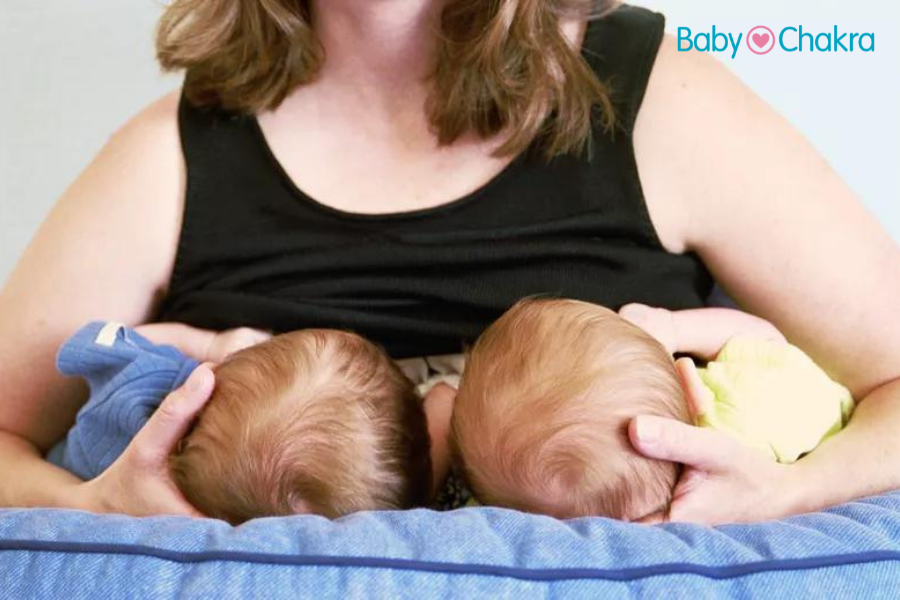
Breastfeeding Twins: Tried And Tested Methods
21 May 2022 | 4 min Read
Manisha Pradhan
Author | 1053 Articles
If you are a new mum, then one of the biggest challenges you may face is breastfeeding your newborn correctly. And if you are a mum to twins then it’s doubly challenging!
But what you need to remember is that having twins does not necessarily mean double the feeding. Once you know how to do it right then you’ll realise how easy it is.
How Often Should You Breastfeed Babies?
In the initial weeks newborns need to be breastfeed at least eight to 12 times per day. Which means about once every two to three hours, day and night. According to Obstetrician And Gynecologist Dr Tshering Yudon, the sessions should each last about 20 to 30 minutes.
Twins; even identical twins have different appetites, nursing patterns and personalities. But nursing twins on the same schedule especially in the initial days is a good idea. As the days progress you will learn that one may need to nurse more frequently than the other. The important thing to remember is to make sure each of the twins are well fed during the feedings. Remember the more you feed the more you produce.
Mum influencer and mum to twins, Charu Sareen Gujja says, “I realised that breastfeeding two kids is not a cakewalk. Through the first month of their birth, all I was doing was juggling between the two babies. Feeding them one after the other would leave me totally drained out. I started getting excruciating back and neck pain.”
She shared it with her doctor and that’s when her doctor suggested she start expressing milk. “While I directly breastfed them three to four times a day, I delegated the task of bottle feeding them to other members of my family. That way I too could rest,” adds Charu.
Charu had her days of engorgement and low supply,suffered from sore nipples and mastitis like most mums. Charu says, “The right nutrition, motivation and support from my family along with my own mental strength and dedication, helped me to sail through it all.”
Charu read and gathered as much information as she could on breastfeeding and also watched videos. She even consulted a lactation specialist to understand what breastfeeding twins involve. She says, “Breastfeeding groups offline or online, help you interact and discuss with other twin mums.”
Dr Tshering Yudon’s Tips On Breastfeeding Twins:
Find the Right Position:
Experimenting and finding a comfortable position to nurse especially when you have to feed two babies is important. Babies can be positioned either in the football hold or the cradle hold, using a pillow to support their heads.
You can even combine both the football and cradle hold using a pillow for support. The point is to find what is most comfortable.
Invest on a Nursing Pillow:
Nursing pillows are especially designed for breastfeeding and there are special ones that are designed for feeding twins as well.
Remember to Switch Breasts:
Switching breasts at each feeding for each baby is important. That way both the breasts are equally stimulated.
Eat a Healthy, Balanced Diet
Breastfeeding mums need to eat a healthy and balanced diet as it not only gives you but also your baby the necessary nutrients and promotes development and healthy, strong growth. Keeping yourself well hydrated is also important.
Did you know that breastfeeding also helps you burn the extra calories you gain during pregnancy? However, that also means you have to eat more regularly, especially when you have two babies to feed.
Cover Image source: verywellfamily.com
A


Suggestions offered by doctors on BabyChakra are of advisory nature i.e., for educational and informational purposes only. Content posted on, created for, or compiled by BabyChakra is not intended or designed to replace your doctor's independent judgment about any symptom, condition, or the appropriateness or risks of a procedure or treatment for a given person.
